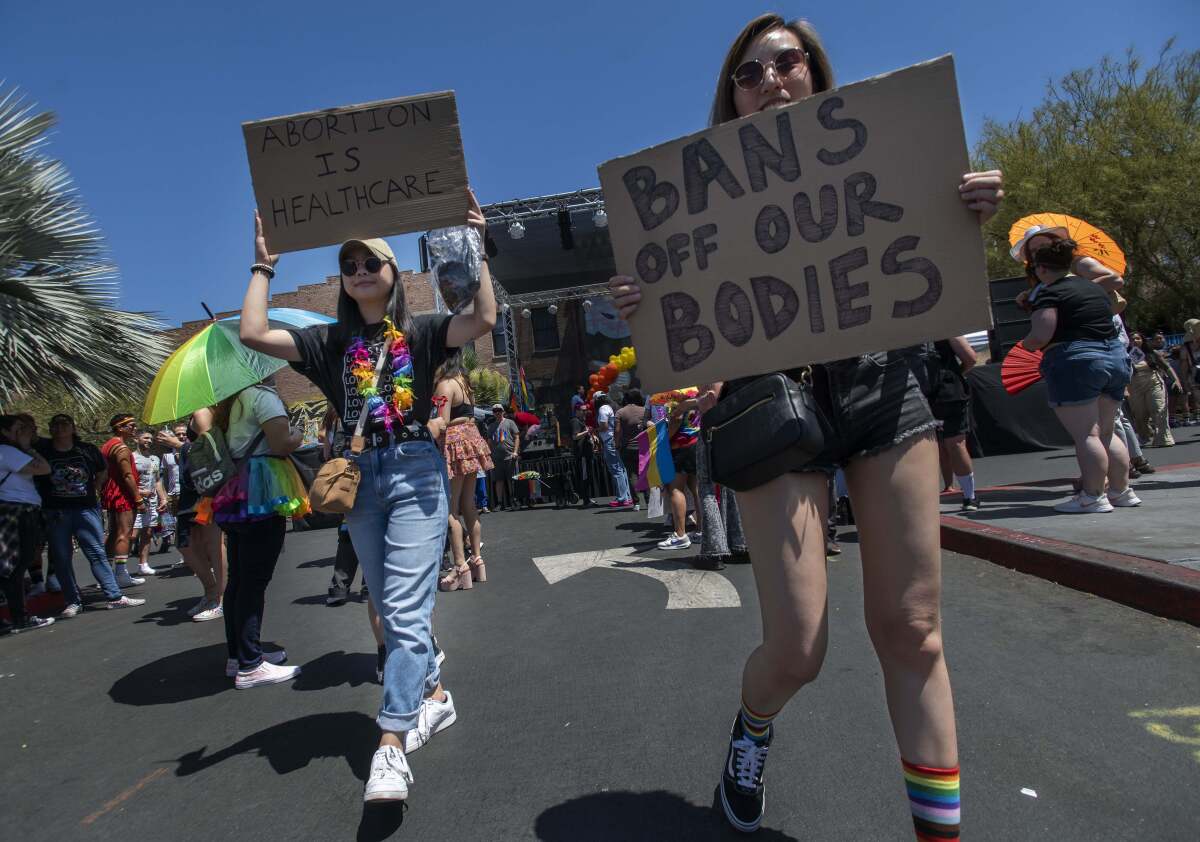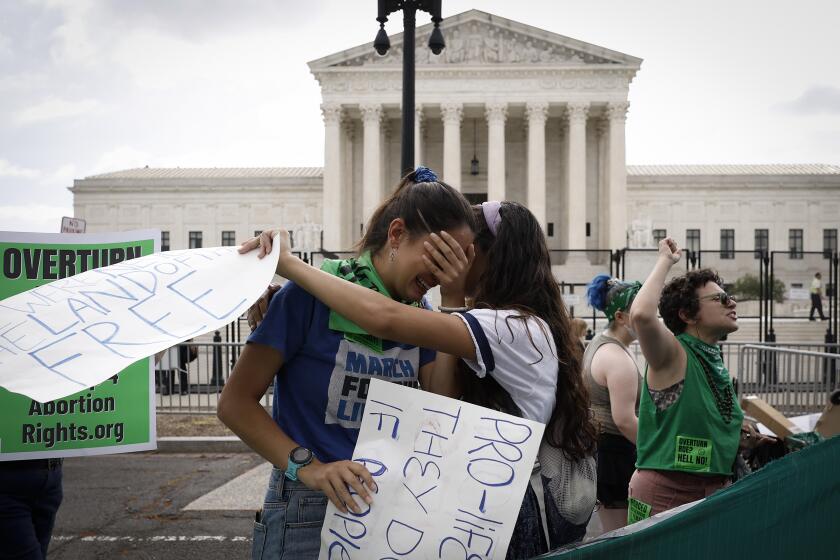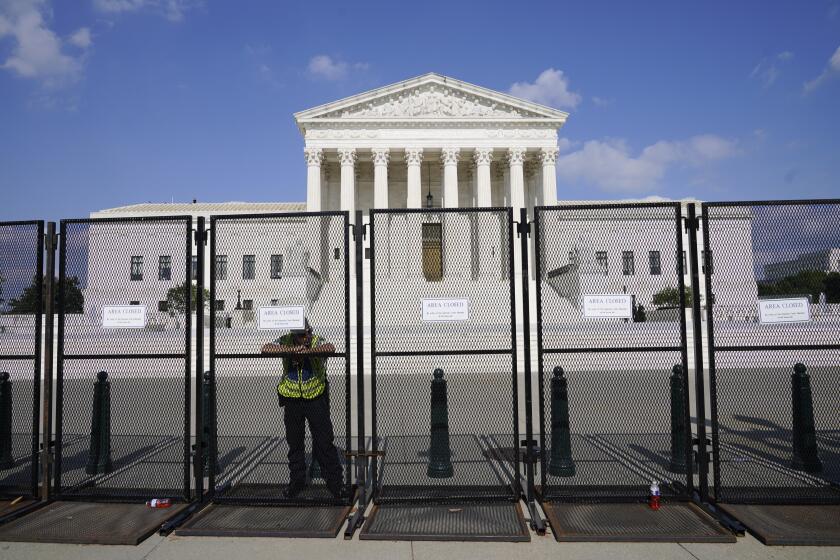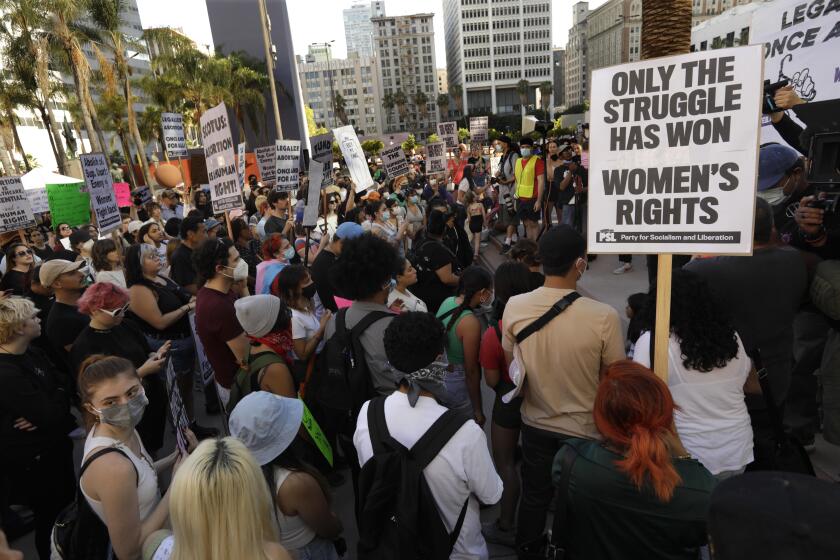Column: A terrible, horrible, no good, very bad Supreme Court decision

- Share via
The Supreme Court’s decision in Dobbs vs. Jackson Women’s Health Organization is a double disaster. First and foremost, overturning Roe vs. Wade will have a devastating impact on the lives of Americans, especially women of childbearing age. Second, it is certain to be disparaged — even derided — by legal scholars and to result in a plunge in the court’s already fragile public standing.
As many observers have noted since the draft decision leaked, a glaring problem with Justice Samuel A. Alito Jr.’s opinion is its singling out of abortion rights as a constitutional stepchild based on the fact that abortion was not protected at the founding, and indeed it was sometimes criminalized.
It’s like shooting fish in a barrel to point out that this historical analysis is impossible to square with the court’s recognition of other unenumerated and previously criminalized rights that the opinion insists it does not put at risk — for example, same-sex and interracial marriage, the use of contraception and engaging in homosexual sex.
In a historic reversal, the Supreme Court strikes down a half-century of nationwide abortion rights in the U.S.
If abortion is a constitutional orphan because previous generations of Americans criminalized it, then how could the court continue to acknowledge any of these other rights?
Inevitably, Alito’s reasoning has gotten pummeled from the left and the right. The joint dissent by Justices Stephen G. Breyer, Elena Kagan, and Sonia Sotomayor has a field day mocking Alito’s incoherent treatment of unenumerated rights.
And from his own side, the far-right flank of judicial (and American) thought, Justice Clarence Thomas’ concurring opinion takes the obvious next step: The court should now reconsider — read: overturn — the whole line of unenumerated rights jurisprudence.
Comparing the leaked draft of the decision with the final product, we can discern the one argument that Alito and the rest of the majority have proffered to try to bolster the contention that abortion can be pulled from the court’s unenumerated-rights jurisprudence without bringing the whole construction down. It’s as follows: “What is distinctive about abortion,” Alito writes, is that it results in the termination of a “potential life.”
As a queer civil rights lawyer, I never imagined these basic rights would be granted and then threatened in my lifetime.
And so it does. That is the core difficulty that makes abortion doctrine so vexing — both the individual and society have vital interests at stake. But Alito’s leap from that truism to the conclusion that the right to abortion merits no constitutional protection rests on an embarrassing flaw in legal reasoning. It is a non-sequitur to say that the existence of a state or societal interest in fetal life means there is no individual interest in whether to bring a fetus to term. A countervailing state interest says exactly nothing about the existence of an individual right.
It is another deep distortion to say, as the Dobbs opinion does, that Roe, and the later decision Planned Parenthood vs. Casey, inadequately protected “potential life.” Both decisions placed substantial weight — many would argue excessive weight — on fetal safeguards. That is why over the years the court upheld a long series of abridgements of the right to abortion, such as spousal notifications and waiting periods.
The very point of the analyses in Roe and Casey was to draw the line between permissible and impermissible “burdens” on the decision to keep or terminate a pregnancy. Alito derides Casey’s admittedly amorphous term “undue burden,” but the task of sorting out what is or isn’t undue in tempering an individual right is a commonplace of constitutional law, and Casey’s framework worked. It created a stable situation, until President Trump’s court appointees put stars in the eyes of antiabortion state legislators who started passing extreme challenges to Roe.
The rise and fall of Roe tells a complicated story about where our rights come from, and what we can do to defend them.
Moreover, Dobbs’ insistence that Roe forbade states “to regard the destruction of a ‘potential life’ as a matter of any significance” is flatly wrong. Instead, it is Dobbs that simply refuses to regard as significant one of the two critical interests in the abortion issue. As of Friday, even the most severe abridgement of the right to an abortion must be sustained “if there is a rational basis on which the legislature could have thought that it would serve legitimate state interests.”
“Rational basis” is the easiest standard to meet to deny a right. It puts women’s control over their own bodies at the same level as the right to play pool at 4 a.m.
Justice Brett M. Kavanaugh’s separate concurrence in the Dobbs decision deserves a special mention for its blithe assurance that “the Court’s decision today properly returns the Court to a position of judicial neutrality on the issue of abortion.”
That’s argle bargle, as Kavanaugh’s idol Antonin Scalia might put it. The vaporization of nearly 50 years of fundamental constitutional protections for women, and the sudden empowerment of red states to vie for which of them can enact the most draconian restrictions, including making abortion a felony, is not an act of judicial neutrality.
In the end, the Dobbs opinion offers nothing remotely persuasive for its determination that Roe was “egregiously wrong.”
The sober assessment of the Dobbs dissenters is the most plausible explanation for the tragic wrong turn the court has taken: The reversal of a long-recognized constitutional right is “based on nothing more than the new views of new judges. The majority has overruled Roe and Casey for one and only one reason: because it has always despised them, and now it has the votes to discard them.”
More to Read
A cure for the common opinion
Get thought-provoking perspectives with our weekly newsletter.
You may occasionally receive promotional content from the Los Angeles Times.














